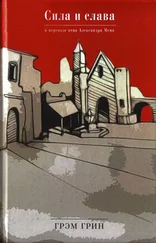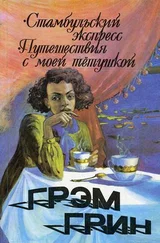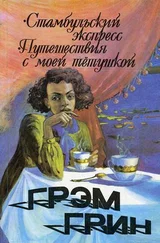Грэм Грин - The Comedians
Здесь есть возможность читать онлайн «Грэм Грин - The Comedians» весь текст электронной книги совершенно бесплатно (целиком полную версию без сокращений). В некоторых случаях можно слушать аудио, скачать через торрент в формате fb2 и присутствует краткое содержание. Год выпуска: 1966, Жанр: Классическая проза, на английском языке. Описание произведения, (предисловие) а так же отзывы посетителей доступны на портале библиотеки ЛибКат.
- Название:The Comedians
- Автор:
- Жанр:
- Год:1966
- ISBN:нет данных
- Рейтинг книги:3 / 5. Голосов: 1
-
Избранное:Добавить в избранное
- Отзывы:
-
Ваша оценка:
- 60
- 1
- 2
- 3
- 4
- 5
The Comedians: краткое содержание, описание и аннотация
Предлагаем к чтению аннотацию, описание, краткое содержание или предисловие (зависит от того, что написал сам автор книги «The Comedians»). Если вы не нашли необходимую информацию о книге — напишите в комментариях, мы постараемся отыскать её.
The Comedians — читать онлайн бесплатно полную книгу (весь текст) целиком
Ниже представлен текст книги, разбитый по страницам. Система сохранения места последней прочитанной страницы, позволяет с удобством читать онлайн бесплатно книгу «The Comedians», без необходимости каждый раз заново искать на чём Вы остановились. Поставьте закладку, и сможете в любой момент перейти на страницу, на которой закончили чтение.
Интервал:
Закладка:
On Sunday afternoon, as I was reading on the verandah, Captain Concasseur drove up in a jeep — I envied him the jeep. The driver who had been assigned to Jones, with the big belly and the gold teeth, sat beside him wearing a fixed grin like an ape being delivered at a zoo. Concasseur didn't get out; they both stared at me through their black glasses, and I stared at them in return, but they had the advantage — I couldn't see them blink.
After a long time Concasseur said, 'I hear you're going to Aux Cayes.'
'Yes.'
'Which day?'
'Tomorrow — I hope.'
'Your pass is for a short trip only.'
'I know that.'
'A day to go and a day to return and one night at Aux Cayes.'
'I know.'
'Your business must be very important to take you on such an uncomfortable journey.'
'I told my business at the police station.'
'Philipot is in the mountains near Aux Cayes and your man Joseph too.'
'You know more than I do. But it's your job.'
'You are alone here now?'
'Yes.'
'No presidential candidate. No Madame Smith. Even your chargй is on leave. You are very isolated here. Are you frightened sometimes at night?'
'I'm getting used to it by now.'
'We'll be watching for you along the road, noting your arrival at each post. You will have to account to us for your time.' He said something to his chauffeur and the man laughed. 'I said to him that he or I will ask you questions if you linger on the road.'
'Just as you questioned Joseph?'
'Yes. Exactly in the same way. How is Major Jones?'
'Not well at all. He has caught mumps from the ambassador's son.'
'They say there will be a new ambassador soon. The right of asylum ought not to be abused. Major Jones would be well advised to move to the British Embassy.'
'Shall I tell him that you'll give him a safe-conduct?'
'Yes.'
'I'll tell him when he's better. I'm not sure that I've had mumps and I don't want to take any risks.'
'We can still be friends, Monsieur Brown. I feel certain you do not like Major Jones any more than I do.'
'You may be right. Anyway I'll give him the message.'
Concasseur backed the jeep into the bougainvillaea, breaking branches with the same pleasure he felt in breaking limbs, turned and drove away. His visit was the only thing that interrupted the monotony of the long Sunday. For once the lights were turned out exactly on time, and the storm poured down the flanks of Kenscoff as though started by a stop-watch; I tried to read in a paperback volume of his short stories Henry James's Great Good Place which someone long ago had left behind; I wanted to forget that tomorrow was Monday, but I failed. 'The wild waters of our horrible times,' James had written and I wondered what temporary break in the long enviable Victorian peace had so disturbed him. Had his butler given notice? I had built my life around this hotel — it represented stability more profoundly than the God whom the fathers of the Visitation had hoped I would serve; once it had represented success better than my travelling art-gallery with the phoney paintings; it was in a sense a family tomb. I put The Great Good Place down and went upstairs with a lamp. I thought it possible — if things went wrong — that this might be the last night I would spend in the Hotel Trianon.
On the stairs most of the paintings had been sold or returned to their owners. My mother had the wisdom in her early days in Haiti to buy an Hyppolite, and I had kept it against all American offers, through the good and the bad years, as an insurance-policy. There remained too a Benoit, that represented the great Hurricane Hazel of 1954, a grey river in flood carrying down all kinds of strangely chosen objects, a dead pig floating on its back, a chair, the head of a horse, and a bedstead with floral decorations, while a soldier and a priest prayed on the bank and the gale beat the trees all one way. On the first landing there was a picture by Philippe Auguste of a carnival procession, men, women and children wearing bright masks. Of a morning, when the sunlight shone through the first-floor windows, the harsh colours gave an impression of gaiety, the drummers and the trumpeters seemed about to play a lively air. Only when you came closer you saw how ugly the masks were and how the masquers surrounded a cadaver in grave-clothes; then the primitive colours went flat as though the clouds had come down from Kenscoff and the thunder would soon follow. Wherever that picture hung, I thought, I would feel Haiti close to me. Baron Samedi would be walking in the nearest graveyard, even though the nearest graveyard was in Tooting Bec.
I went up first to the John Barrymore suite. When I looked out of the window I could see nothing; the city was in darkness, except for a cluster of lights in the palace and a line of lamps which marked the port. I noticed Mr Smith had left a vegetarian hadbook by the bed. I wondered how many he carried with him for distribution. I opened it and found on the flyleaf a message written in his clear slanting American hand. 'Dear Unknown Reader, do not close this Book, but read a little before you sleep. There is Wisdom here. Your Unknown Friend.' I envied him his assurance, yes, and the purity of his intention too. The capital initials gave the same impression as a Gideon Bible.
On the floor below was my mother's room (I slept there now), and among the closed guest rooms, which had known no visitors for a long time, was Marcel's room and the one in which I had lain that first night in Port-au-Prince. I remembered the clanging bell and the great black figure in the scarlet pyjamas and the monogram on the pocket and how he had said to me sadly and apologetically, 'She wants me.'
I went into the two rooms in turn: they contained nothing of that remote past. I had changed the furniture, I had painted the walls, I had even altered their shapes, so that bathrooms could be added. Dust lay thick on the porcelain of the bidets and the hot-water taps ran no longer. I went into my room and sat down on the big bed which had been my mother's. I almost expected, even after all the intervening years, to find a thread on the pillows of that impossibly Titian hair. But nothing survived of her except what I had deliberately chosen to keep. On a table by the bed was a papier mвchй box in which my mother had stored some improbable jewellery. The jewellery I had sold to Hamit for next to nothing, and the box now contained only that mysterious medal of the Resistance and the picture-postcard of the ruined citadel which carried the only writing I had of hers addressed to me — 'Nice to see you if you come this way' and the signature that I had taken for Manon and the name she had never had the time to explain to me, 'Comtesse de Lascot-Villiers'. There was also another message in the box written in her hand but not to me. I had found it in Marcel's pocket when I cut him down. I don't know why I preserved it, or why two or three times I had re-read it, for it only deepened my sense of being without parentage. 'Marcel, I know I'm an old woman and as you say a bit of an actress. But please go on pretending. As long as we pretend we escape. Pretend that I love you like a mistress. Pretend that you love me like a lover. Pretend that I would die for you and that you would die for me.' I read the message again now; I thought it movingly phrased … And he had died for her, so perhaps he was no comйdien after all. Death is a proof of sincerity.
2
Martha greeted me with a glass of whisky in her hand. She was wearing a gold linen dress and her shoulders were bare. She said, 'Luis is out. I was taking a drink to Jones.'
'I'll take it up for you, 'I said. 'He'll need it.'
'You haven't come for him?' she asked.
'Oh yes, I have. The rain is just beginning. We'll have to give it a little while longer until the guards take shelter,
Читать дальшеИнтервал:
Закладка:
Похожие книги на «The Comedians»
Представляем Вашему вниманию похожие книги на «The Comedians» списком для выбора. Мы отобрали схожую по названию и смыслу литературу в надежде предоставить читателям больше вариантов отыскать новые, интересные, ещё непрочитанные произведения.
Обсуждение, отзывы о книге «The Comedians» и просто собственные мнения читателей. Оставьте ваши комментарии, напишите, что Вы думаете о произведении, его смысле или главных героях. Укажите что конкретно понравилось, а что нет, и почему Вы так считаете.



